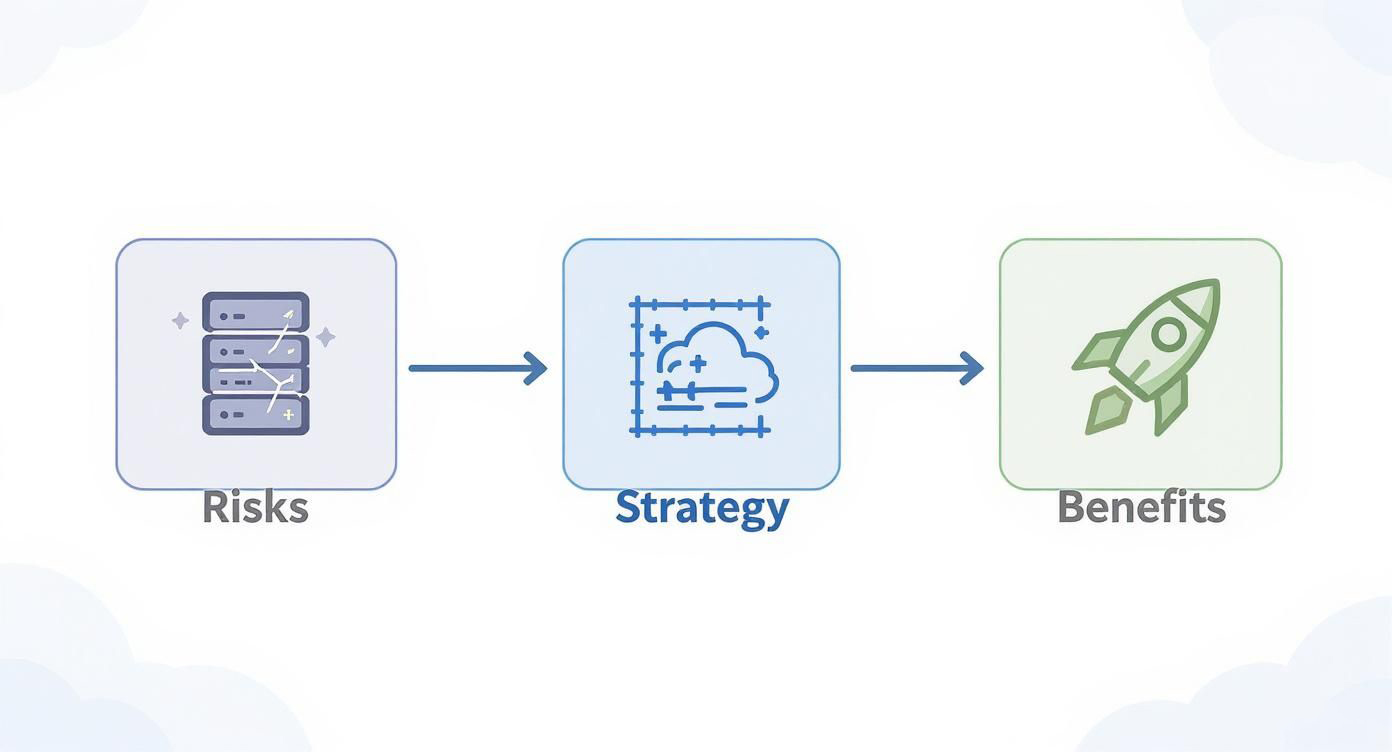Cloud Strategy Consultant: Your Guide to Cloud Success
Think of a cloud strategy consultant as the architect of your digital future. They’re not just tech advisors; they craft the blueprint that connects your business goals to the right cloud technology, making sure every move you make supports growth, efficiency, and real innovation.
Your Business Architect for the Digital Age

It’s helpful to think of a cloud strategy consultant like a master city planner. A planner doesn’t just lay down roads wherever there’s empty space. They design a complete transportation grid that links homes to businesses, keeping traffic flowing and planning for future expansion. A cloud consultant does the same for your digital infrastructure.
They start by digging into your current operations to find bottlenecks and opportunities. From there, they design a cloud environment that’s not only secure and cost-effective but also built to support your long-term vision. This is about so much more than just migrating data; it’s about fundamentally rethinking how your business operates to become more agile and resilient.
This kind of strategic guidance is in high demand. The global market for Cloud Strategy Consulting Services hit a staggering USD 15.2 billion in 2023 and is expected to climb to USD 42.7 billion by 2033. This surge shows just how critical this role has become.
A strategic approach ensures your investment in cloud services pays off with tangible results, from simplifying day-to-day tasks to uncovering entirely new revenue streams.
Core Functions and Business Impact
So, what does a cloud strategy consultant actually do? Let’s break down their core functions to see how their work directly impacts your bottom line.
This table gives a snapshot of their key responsibilities and the value they bring to the table.
| Core Function | Business Impact |
|---|---|
| Business Goal Alignment | Ensures technology investments directly support revenue growth and strategic objectives, preventing costly misalignments. |
| Technology Roadmap Creation | Provides a clear, step-by-step plan for cloud adoption, minimizing risks and ensuring a smooth, predictable transition. |
| Cost Optimization (FinOps) | Implements financial governance to control cloud spending, preventing budget overruns and maximizing return on investment (ROI). |
| Security & Compliance Planning | Designs a robust security framework to protect sensitive data and ensure adherence to industry regulations like GDPR or HIPAA. |
| Vendor Selection & Management | Helps choose the right cloud providers (AWS, Azure, GCP) and tools, avoiding vendor lock-in and optimizing performance. |
Ultimately, their job is to translate complex technical possibilities into a clear, actionable plan that delivers measurable business success.
What Does a Cloud Strategy Consultant Actually Do?
A good cloud strategy consultant does a lot more than just offer big-picture advice. They roll up their sleeves and deliver concrete services that turn your business goals into a real, working cloud environment that’s secure, efficient, and doesn’t break the bank. Think of these services as the essential steps that take you from a vague idea to a clear, executable roadmap.
And the need for this kind of hands-on expertise is exploding. The global Cloud Consulting Services market is expected to rocket from USD 31.8 billion in 2025 to a staggering USD 121.15 billion by 2033. That’s not just a trend; it’s a massive signal that businesses everywhere need help navigating this complex territory. You can learn more about the rapid growth in cloud consulting and see why so many are seeking out expert guidance.
The Core Services You Should Expect
A seasoned consultant will walk you through a few critical phases. These aren’t just technical exercises; they’re strategic moves that make your entire operation stronger and more agile.
Here’s what that journey usually looks like:
- Cloud Readiness Assessment: This is ground zero. The consultant takes a hard look at your current IT setup—your infrastructure, your applications, how your teams work—to pinpoint the real opportunities and potential roadblocks. It’s all about answering the question, “Where does the cloud actually make sense for us?”
- Multi-Cloud and Hybrid Strategy: Putting all your eggs in one basket is rarely a good idea. A consultant will help you build a strategy that uses the best tools from different providers, like AWS, Azure, and Google Cloud. This approach keeps you from getting locked into one vendor and gives you the flexibility to build a truly customized, resilient system.
- Security and Compliance Planning: Security isn’t an afterthought; it has to be baked in from the beginning. A consultant designs a solid security plan to protect your data and makes sure you’re compliant with any industry rules you’re subject to, like HIPAA or GDPR. It’s about getting ahead of risks before they become problems.
- Financial Operations (FinOps) Setup: It’s shockingly easy for cloud costs to get out of control. A consultant will put FinOps practices in place to give you a clear view of what you’re spending and why. This gives you the control to manage your budget effectively and make sure you’re getting a real return on your investment.
These services are key parts of the broader cloud services that create a powerful and efficient foundation for whatever you’re building next, from SaaS Consulting to advanced analytics.
Why You Can’t Afford to “Wing It” in the Cloud
Jumping into the cloud without a solid plan is like setting sail without a map. You might feel a sense of progress, but in reality, you’re probably just drifting, wasting money, and sailing straight into a storm you can’t see coming. Think of a cohesive cloud strategy not as a technical manual, but as your business’s survival guide for today’s world.
Without that guide, businesses stumble into the same old traps. Unchecked cloud spending is probably the biggest one. Costs balloon seemingly overnight because resources aren’t tracked, managed, or optimized. This “pay-as-you-go” model quickly becomes “pay-way-too-much,” draining a budget that should be fueling growth.
Security is another huge risk. A haphazard move to the cloud can punch massive holes in your defenses, leaving sensitive company and customer data wide open. At the same time, innovation grinds to a halt. Your teams end up playing whack-a-mole with a chaotic system instead of building things that actually move the needle.
From Putting Out Fires to Gaining an Edge
A good cloud strategy consultant completely flips that script. They turn those potential disasters into real business advantages by creating a deliberate, forward-thinking plan that tackles these challenges before they even start. Their goal is to make sure your journey to the cloud is both safe and financially sound.
But this strategic foundation is about more than just dodging bullets—it’s about unlocking what’s possible. It creates the stable, organized environment you need to actually use advanced technologies well. For example, you can’t get meaningful results from powerful business intelligence services if they’re running on a shaky, disorganized foundation.
A thoughtful cloud strategy transforms your infrastructure from a simple cost center into a dynamic engine for innovation, agility, and sustainable growth. It’s the difference between merely using the cloud and truly mastering it.
Ultimately, this alignment helps your organization grow up. You stop being a passive consumer of technology and start acting as a true AI solutions partner to your own mission. With a strong cloud backbone, you can confidently explore and roll out next-generation tools, a topic we explored in our AI adoption guide. The right strategy doesn’t just get you to the cloud; it makes sure you thrive once you’re there.
How a Consultant Builds Your Cloud Roadmap
Building a cloud roadmap isn’t something that happens in a single meeting. It’s a hands-on, collaborative process where a seasoned consultant works side-by-side with your team to turn high-level business goals into a practical, step-by-step plan. This structured approach makes sure every decision is thoughtful, every risk is anticipated, and every dollar is well spent. It all unfolds over a few key phases.
This process is really about turning abstract risks and opportunities into a clear strategy that delivers real business value.

As you can see, it’s a clear path from figuring out today’s problems to designing a blueprint for the future—one that leads directly to faster growth and real innovation.
Phase 1: Discovery and Assessment
Everything starts with a deep dive. The first thing a consultant does is get to know your business inside and out: your current tech, how your teams work, your security situation, and most importantly, what you’re trying to achieve. This is more than just a tech audit; it’s about connecting the dots between your IT infrastructure and your company’s vision.
This phase is heavy on stakeholder interviews, analyzing your entire application portfolio, and reviewing your existing hardware and software. The main takeaway here is a Cloud Readiness Assessment—a document that clearly lays out your opportunities, potential roadblocks, and some initial recommendations.
Phase 2: Strategy and Design
Once we know where you are, it’s time to map out where you’re going. This is the architectural phase, where the actual blueprint for your cloud environment gets drawn up. It’s where big decisions are made, like choosing the right cloud model (public, private, hybrid) and picking the best providers for the job, such as Amazon Web Services (AWS), Microsoft Azure, or Google Cloud Platform (GCP).
During this stage, the consultant will produce a detailed Total Cost of Ownership (TCO) analysis and outline a solid security and compliance framework. This strategic design work is what guarantees your final setup will be secure, scalable, and makes good financial sense.
Phase 3: Migration Planning and Governance
With a solid strategy in place, the next step is to figure out exactly how to get there. This phase is all about the “how” and “when” of the transition. Your consultant will create a prioritized migration schedule, mapping out which applications should move first and the best methods for moving them. A well-built plan is crucial for avoiding business disruption.
A robust governance framework is also built here. This is the rulebook for your cloud environment, defining the policies and controls for managing everything long-term. Think of it as the key to maintaining security, keeping costs in check, and ensuring everything runs smoothly.
This foundational work doesn’t just get you to the cloud; it sets you up for what comes next. You can confidently start thinking about advanced projects, knowing your cloud environment is built to handle them, including ambitious AI development services.
Mapping the Journey
A cloud strategy roadmap provides a comprehensive, phased approach to cloud adoption. Here’s a table that breaks down what you can expect at each stage of the engagement.
Phases of a Cloud Strategy Roadmap
| Phase | Key Objectives | Typical Deliverables |
|---|---|---|
| Discovery | Understand the current state, business goals, and technical limitations. | – Stakeholder Interview Summaries |
| – Cloud Readiness Assessment | ||
| – Initial Risk Analysis | ||
| Strategy | Define the future cloud vision, select models and providers, and establish a business case. | – TCO & ROI Analysis |
| – Cloud Architecture Blueprint | ||
| – Security & Compliance Framework | ||
| Planning | Create a detailed, actionable plan for migration and governance. | – Prioritized Migration Plan |
| – Cloud Governance Model | ||
| – Communication & Training Plan | ||
| Execution | Implement the plan, migrate workloads, and optimize the new environment. | – Migrated Applications & Data |
| – Operational Playbooks | ||
| – Performance Monitoring Dashboards |
This structured progression ensures that from the very first conversation to the final implementation, every action is aligned with your strategic business outcomes.
How to Choose the Right Cloud Strategy Consultant

Picking a cloud strategy consultant isn’t like hiring a typical vendor. You’re bringing on a long-term strategic partner, someone who will help shape a core part of your business. The right choice goes way beyond just finding a competitive price; it’s about deep expertise, a clear process, and a track record of delivering real business results.
A great place to start is by looking for specialized experience. Does the consultant have a documented history in your industry? For example, if you’re in a highly regulated field like healthcare, a partner with proven success in healthcare software development will already grasp your unique compliance and operational hurdles. That kind of niche knowledge is invaluable.
The market demand for this kind of guidance is surging. In 2024, cloud professional services—which includes strategic consulting—accounted for nearly 32% of the total global market revenue. Experts project this will swell to $118.79 billion by 2033, which shows just how critical expert advice has become for getting cloud adoption right. You can dig into the numbers yourself in the full research on cloud professional services growth.
Key Evaluation Criteria
Beyond just industry experience, there are a few core qualifications that separate the best partners from the rest. A top-tier consultant doesn’t just give advice; they have a clear, repeatable methodology that consistently produces results.
Here’s a practical checklist for your evaluation:
- Official Certifications: Check for credentials from the major players like AWS, Azure, and Google Cloud. Think of these as a baseline—they prove a consultant has foundational technical skills and stays current with best practices.
- A Transparent Methodology: Don’t be afraid to ask them to walk you through their process. How do they handle security? What’s their approach to FinOps and long-term support? A solid, well-defined framework is a sign of a mature and reliable operation.
- Verifiable Case Studies: The ultimate proof is in their past work. Ask for detailed client cases that show their strategies in action and, most importantly, demonstrate measurable outcomes for businesses like yours, including Custom Ecommerce Solutions.
At the end of the day, a great cloud strategy consultant offers more than just technical chops. They bring the strategic foresight needed to guide your journey from start to finish. To get a better feel for what a strong partnership looks like, take a look at our cloud consulting services.
Got Questions About Cloud Consulting? We’ve Got Answers.
Let’s clear up a few common questions that pop up when business leaders start thinking about bringing in a cloud strategy consultant. Getting straight answers can make the whole process feel less intimidating and really show you the value a good partner brings to the table.
What’s the Difference Between a Consultant and an MSP?
Think of it this way: a cloud strategy consultant is the architect, and a Managed Service Provider (MSP) is the general contractor and building manager.
The consultant is the one who sits down with you to understand your business goals first. They design the blueprint—the “why” and “how” of your move to the cloud, making sure the technology strategy perfectly aligns with where you want your business to go.
An MSP, on the other hand, is the operator. They take that blueprint and handle the day-to-day work—the “what.” They manage, monitor, and maintain your cloud environment, keeping the lights on and the systems running smoothly. You need both, but the strategy has to come first.
What Does It Cost to Hire a Cloud Strategy Consultant?
The cost really depends on the scope and complexity of your project. But instead of seeing it as an expense, think of it as an investment in getting it right the first time.
A good consultant pays for themselves, often many times over. They do this by finding ways to optimize your spending, sidestep major security risks, and speed up your ability to innovate. This upfront investment prevents incredibly costly mistakes down the road and turns your cloud services from a simple utility bill into a real engine for growth.
Is This Service Really for Small Businesses?
Absolutely. In fact, for small and mid-sized businesses, getting the cloud strategy right from the get-go is arguably even more critical. You don’t have the budget for expensive do-overs.
A consultant helps you pick scalable, cost-effective solutions and build a secure foundation that you can grow on. When every dollar counts, that kind of expert guidance is invaluable. It ensures you’re not just building for today, but also laying the groundwork for more advanced tools, like bringing AI for your business into the picture later on.
How Long Does a Cloud Strategy Project Usually Take?
Creating the initial roadmap—that clear, actionable plan—can take anywhere from a few weeks to a couple of months. It all depends on how big and complex your organization is. The main goal is to leave you with a plan your team feels confident executing.
After that, many companies choose to keep their consultant on retainer. This allows the strategy to evolve as the business changes, ensuring it keeps delivering value. It’s a lot like an ongoing partnership for custom software development, where you continuously adapt the product to stay ahead of the curve.
Ready to build a cloud strategy that delivers real results? At Bridge Global, we are your dedicated AI solutions partner, bringing together deep cloud expertise and strategic vision to map out a plan for your specific goals. Contact us today to get the conversation started.



